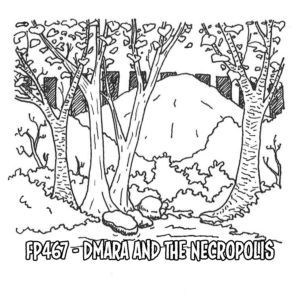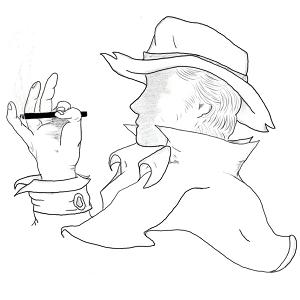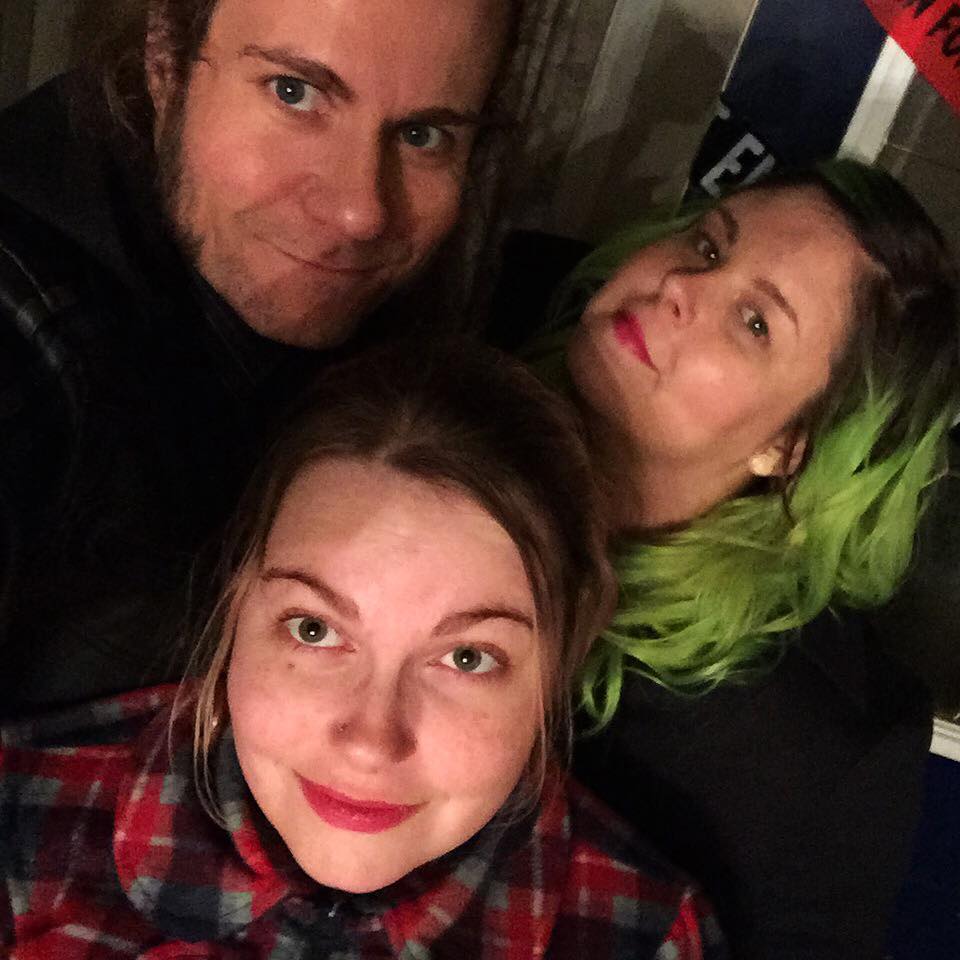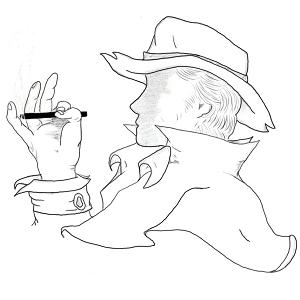Welcome to Flash Pulp, episode four hundred and sixty-seven.
 Tonight we present Dmara and the Necropolis
Tonight we present Dmara and the Necropolis
[audio:http://traffic.libsyn.com/skinner/FlashPulp467.mp3]Download MP3
(RSS / iTunes)
This week’s episodes are brought to you by The Weekly Podioplex!
Flash Pulp is an experiment in broadcasting fresh pulp stories in the modern age – three to ten minutes of fiction brought to you Monday, Wednesday and Friday evenings.
Tonight we find ourselves exploring a land ravaged by many plagues, a place both familiar and distant, at a time of endings.
Dmara and the Necropolis
Written by J.R.D. Skinner
Art and Narration by Opopanax
and Audio produced by Jessica May
Dmara had been born on the plain by the sea some five years after her parents’ landing.
In a prior life Ecem, her father, had worked in construction, and Guler, her mother, had been a teacher – then the world had begun to end. Neither had harboured any superstitions, so, when it became apparent that the northern isle, long emptied of humanity by a sweeping plague, had been left to allow its abandoned crops and untended cattle to grow riotous, they had departed their home on foot. Her mother had filled her satchel with books, while her father had gathered no more than necessary to sleep and eat until their arrival.
In the end he’d been forced to trade much of his limited supply to a starving man with a thin mustache who’d swapped a dinghy for a week’s worth of tuna mashed into cans.
Still, though the crossing had been rough, they had left behind the gunfire and looting that marked civilization’s passage into darkness.
That was not to say, however, that there were no dangers left to their existence. Though meat was plentiful on the island, the beasts who carried it upon their bones were greatly reluctant to give it over. Wild hog tracks marked the point of her northernmost adventures, and her parents’ most trusted source of holiday feasts, yet the swine were equally as hungry, and Dmara had once been treed for the better part of the day by a mother and her ravenous children.
There were also signs of the old world – rusting nails protruding from storm demolished ruins, places where wind and fire had left sheets of metal as sure as blades before tangling brambles blanketed the scene and set a trap for mislaid legs.
Worse were the dogs, brutish and patchy, their wolfen nature growing more brazen with each generation further from the leashes that had once held them. As a child she remembered her father scaring them off with little more than a pair of pans clanging together. Dmara even recalled times when they would make a parade of it, the child in her scavenged short pants chasing her sun-baked father about the yard’s perimeter while clanging a spoon upon a pot.
By the age of ten they no longer gave chase to the feral beasts, instead standing off against them with curse words and weapons ready. It was a waste of arrows to attempt to thin the pack. It was rare to retrieve the fired bolt, as the cur would flee as soon as injured, and they were all too aware of the aging state of the bow strings reclaimed from the dead society that had once ruled the territory.
The threat that ate at Dmara’s heart from her youngest age, however, was loneliness. There were no other children upon the island – they were not entirely alone, they had discovered, but the sort who’d also fled to this land were not the kind to easily trust. Distance, it was decided, was best – but the solitude of her existence chased Dmara across every page she read, every game of hide and seek she played with her favoured doll, every secret she whispered to no one under the soft glow of the night sky.
Escape was a notion constantly in her mind, for she understood they were not masters of these wilds, simply its inhabitants. She asked often of the route her parents had taken, in case she might one day reverse it and find someone to talk to, but homesteading was no easy business, and they found scant time, between labour and exhaustion, for such conversation.
In her sixteenth year it became apparent that there was no escaping Ecem’s cough. It was a building thing, too slow and long-lasting to be the sign of a simple cold, and her father would often nod to himself at the conclusion of each fit.
When he would catch sight of her worried face – the tightness about her eyes and the habit of chewing at her upper lip, both a reflection of her mother’s own customs – he would say, “no, fret not. When we left we knew there were risks in cutting ourselves off from the conveniences of the greater world, but, if I am honest, we never would have lived this long if we had remained. I have seen those I love to a better place, and if I can manage to die in my bed I’ll be a luckier man than most of the friends I once knew.”
Though his mattress was little more than hay, bailed by their own hands the previous autumn, he got his wish.
The burial ceremony was a simple one, but it did hold one irregularity: Having spotted the women with their shovels, their sole and distant neighbour, Mr. Dawson, made a rare appearance.
To Dmara the man seemed ancient. He had lived on the island before it had been wiped clean of human life, and had survived only through the coincidence of having been working afar at the time of its collapse.
They had been aware of his presence since those earliest days, but a lack of common language, and the old man’s propensity for privacy, meant they had crossed paths but a few dozen times in the entirety of Dmara’s life. Now, at perhaps that span’s lowest point, he appeared, a basset hound puppy trailing at his heels.
He approached silently, as he knew his words would mean nothing, but he extended a hand for her shovel and pushed her gently towards the dog. Though the beast’s eyes were hidden behind brown folds of furred skin, it danced in place, showing as much excitement as its stubby limbs would allow.
There’d been no such offer of assistance two years later when, after having her right calf opened by a froth-mouthed mongrel, Guler had said her goodbyes from the same bed that had held her husband.
Once she’d laid her mother beside her father, the notion had come to Dmara that there was no one left to keep her from her northern boundary, but the memory of her mother’s injury was still too fresh.
It was a week of silence that finally drove her to Mr. Dawson’s distant cabin.
As she approached she turned a dozen excuses for her intrusion over in her mind, but all were voided upon her arrival: She found the old man’s remains sprawled in his dooryard, and his hound howling from the gaping entrance of his cottage.
She could but guess how long the vigil had lasted by the prominence of the dog’s ribs.
Dmara had never known the animal’s original name. She called it Hadir, or, more simply, Had.
For a time the sole words she heard spoke aloud were her own, and usually: “Had, get out of there.”
Though the plot her parents had cultivated was now producing more than she could eat, its lone survivor made no effort to reduce its size. Sometimes she told herself it was because there would inevitably one day be, by land or sea, a visitor. Sometimes she simply acknowledged that it was better to keep busy and find herself with a surplus than run short and be pressed into scavenging the countryside during the cold months.
At night she dreamt of the boat – of pushing off and retracing her parents’ steps, but each time she landed her slumbering mind turned up only shattered homes and burning garbage along her route.
Here she had food, and a known routine – and, yes, loneliness.
She read, and when the books ran out, she scrounged paper and began to write her own. Dmara read them all to Had, but he was an easily pleased audience that offered little in the way of critique.
Then, on the first warm day of the third summer following her mother’s death, she heard a rumble upon the horizon.
Dmara was aware of the existence of machines. She had read of many, and in her youth they had often gone on what Ecem had called camping trips. In reality they were excursions to sift the remains of the old world and collect tools. Eventually belts snapped, batteries died, or the gas ran dry, however, and in each instance they had inevitably found it necessary to find or construct a manually operated replacement.
Yet the noise of the tilling engines her father had once operated were whispers when compared to this new sound. It was as though she felt the rumble as much in her feet as she heard its roar in her ears.
On the fifth day, the droplets upon the spout of her pitcher of morning water now trembling with the commotion, Dmara set out to discover the source of the disturbance.
Had followed.
Dmara had focused her recent hours on experimenting with frying patties of shredded potato spiced with chives and sea salt, and she bundled enough to carry her and her companion through several days of journey. She knew not how long she’d be, nor if she’d be forced to hide for some time to allow for a threat to pass.
They were sharing such a patty, and muttering about their aches at having spent the night in a stony field, when they first encountered the towering structures. Each ceased their chewing immediately.
 The roar had become immense. Dmara had been forced to sheer a length of cloth into scarves, which she wrapped about both her and Hadir’s ears, to make their approach more bearable, but their progress had been slowed by creeping from fallen wall to thick-limbed oak in an attempt to keep themselves from sight.
The roar had become immense. Dmara had been forced to sheer a length of cloth into scarves, which she wrapped about both her and Hadir’s ears, to make their approach more bearable, but their progress had been slowed by creeping from fallen wall to thick-limbed oak in an attempt to keep themselves from sight.
Despite their precautions they had seen no sign of ravenous hogs, nor of Had’s feral cousins.
This close it became apparent that the calamity had not just one source but many – here were a horde of great maws that opened wide and scooped the countryside into a boxy throat whose jaws glinted with barbed spinners. Behind these tracked machines roamed yellow monstrosities that crushed the barren countryside with a single thick wheel, pressing anything that might have escaped the ravenous mouths into the muck.
In the third and final tier marched a row of towers, ten across, that stood over even the house-sized rollers. Dmara had seen buildings of similar heights in books, but she had never included any such in her own stories because she had, until that moment, been unable to entirely convince herself anything so large could truly be erected.
There was no speed in their advance, however, as the invaders apparently prized thoroughness over forward progress, and so Dmara sat patiently, chewing slowly at her potato and watching the giants dance.
A beeping began, nearly lost in the cacophony, and one of the towers lifted high. Beneath, no more than a quarter of its height tall, sat a pristine two-story house. Its exterior appeared to be constructed of brown brick, but its shutters were a crisp white, and its roof was covered in flat black tiles.
Dmara spotted the massive wheels that marked the tower’s source of locomotion as it crawled forward – then, like a mother bird having shifted upon her nest, it resettled just beyond the walls of its previous egg.
The cycle continued. The maws ate, the rollers flattened, and the towers gave birth. Sometimes they would stop and turn, creating corners to the useless neighbourhood that they would then continue to stitch with houses.
As she considered, the blockade of churning metal stretched from horizon to horizon.
Had began to whimper.
“Not now,” she replied, but an errant hand rose up to soothe the animal.
How far the houses extended beyond the line of iron, like a snail’s trail, she could not say, but if they were to continue their march – and she had no reason to believe they would not – then one day, one day soon, they would reach her home by the sea.
Ten towers forming an endless ten block stripe across the landscape would be enough to flatten everything her parents had worked for – and there was no chance of planting crops in a fresh field in time to survive the winter months.
She was still stroking Had’s right ear when she spotted the gap.
The maws and the rollers had judged a certain rocky outcropping, really no more than a high ridge of stone, too much of an obstacle to eat or flatten, and the tower in their wake had adjusted course as necessary.
Dmara had no interest in running the gauntlet of the machines, as the tide had already rolled over this little island, so she instead began to cast about in the underbrush that acted as their concealment. Finding a second such spine of stone, she climbed to its peak.
It was still a two day wait for the flood to overtake her and Had. The hound whined his way through the ruckus, but otherwise sat stoically at her side.
There’d been much to learn at the approach – less visible, much smaller vehicles seemed to act as ferries between the larger concerns, but eventually the noise became too much, and all she could do was hold Had to calm his quaking.
The towers loomed, rolled forward, settled their massive girth onto the freshly shorn and flattened land. At the base of their boxy corners she caught sight of another beast, low but long, that trailed hot blacktop in its wake, laying out a road even as the monolith to her left completed its delivery.
Finally the thing seemed to exhale then lift away, and she found herself in the calm of the wake of the grinding curtain.
Had danced from paw to paw as they descended from their stony island. Rather than set foot on the still-warm roadway, however, they tread the flattened grasses to the nearest front door. Inside all was pristine: Hardwood floors reflecting the trees that had once grown in the dirt upon which the structure stood, a chimneyless fireplace whose gray slate was echoed in the stone-upon-timber kitchen counter and island, and everywhere white walls carrying freshly baked panes of window glass.
The situation was not entirely without precedent in Dmara’s mind. Her father had told her of such sights, in the final years of the world’s collapse. Automated factories meant to replace the unsafe wreckage left in the wake of plague and warfare, the machines were thoughtless brutes meant to be fed a plan which they could carry out unattended across a week or month. Here their advance had somehow been engaged without proper instructions, and so they’d stamped a straight line of civilization’s shadow across the countryside.
It was obvious there was nothing here for her, but it was only in the silence provided by a shut front door that she realized escaping this barren necropolis would not be so easy as entering it.
There was no food here, and the tight rows of houses meant she’d have little room to grow some even if she had seed. The place was as good as a desert, and she had no idea how far she might have to go to reach its opposite boundary.
Worse, there had not been, as she’d hoped, any further clue as to how she might halt the march.
This was the first Dmara had ever truly felt cut off from her home, from her imagined route of escape, and her heart began to pound. She longed for someone to talk out the problem with. She wished to be calmed by her father’s sarcastic teasing or her mother’s exasperated tenderness.
The hound licked her hand, and she took some moist comfort in his effort.
He was mid-lather when his nose overrode his focus. Wheeling in place, Had began to bark and sprint from the hollow living room in which they’d been standing.
Pulling wide the handle at which the dog demanded exit, the woman came upon a scene so unlikely she slammed the door shut again.
There was no time to reconsider before the knock came.
The stranger was perhaps sixteen, her blond hair filthy but held in a tight knot fastened by a leather strip. She wore what Dmara suspected had once been a set of coveralls, but repairs and modifications had driven the gray fabric into a new existence. Pockets abounded, and where pockets would not fit she’d mounted metal rivets and clips to allow for carrying. The newcomer jangled with hanging wrenches, screwdrivers, and tools less familiar to the recluse’s eye.
Her cheekbones had been made sharp by lingering hunger, but she offered Dmara a welcoming smile.
Behind her stood a dozen more men and women, each dressed in scraps of the old world, each brandishing an array of scavenged equipment.
“Hello,” said the girl.
“Hello,” answered Dmara.
They would quickly realize these were the only words of understanding they shared, but the thread was enough to pull Dmara and Had out into the street to greet the rest.
Her discoverer seemed the youngest of the party, and the teen chattered endlessly at her elbow in a dialect that meant no more than bird song to the solitary woman, but Dmara’s need for understanding pushed the pair into a game of pantomime.
Dmara began with the most obvious step, an introduction. Pointing to herself she repeated her name twice, and the group echoed. Then she pointed up and over the receding spines of the construction towers with her left hand while pointing to herself with her right.
There was a brief bit of chatter among the tool-bearers, then they seemed to agree on a translation. The blond threw up a finger in an encompassing circle that included all of her companions, then she waved towards the horizon to the north. She kept waving.
They had clearly traveled a great distance.
This, to Dmara’s mind, explained the slight limbs and sunken cheeks that seemed as much a part of their uniform as their coveralls and tools. What was there to hunt or harvest along the endless streets? If they had come chasing the machines, as it seemed they must, then they would have had to have begun from some place beyond the houses, and their supplies must be nearly at an end – or, at least, their pockets seemed to carry more metal than food.
Having apparently conveyed the notion of distance, her new friend took up a new mime, pointing first in the direction of the rumble, and then placing a beaked hand to her mouth and chewing.
They must, Dmara concluded, be asking for food. She hesitated – but it was a brief pause. Opening her belt-hung sack, she handed across more than half of her remaining potato patties.
The blond girl’s mouth formed a surprised O, but the group fell upon the offering with lips upturned in a universal sign of gratitude. All attempts at conversation stopped until the strangers had completed licking the last of the crumbs from their dirt-encrusted fingers, then the self-appointed diplomat repeated the same actions of pointing and chewing, although the look of frustration on her face made clear she understood she wasn’t conveying her point.
Had, still at Dmara’s side, tilted his head.
Was she trying to say the group was intending on eating the machines? This seemed unlikely. Was she somehow referencing those gnashing engines that led the column? Was it something else? What the machines themselves ate?
What did, in fact, the invaders eat?
Dmara was aware that the world had once run on electricity. In her youth Ecem had shown her flashlights by which they could read at night, and for many years he had collected instruments that required an increasingly arduous search for batteries to maintain – clocks doomed to endlessly count to twelve, tiny screens playing out images in a language she didn’t comprehend, radios upon which her father would waste his night hours hunting for a voice that never spoke.
If the giants had come this far their own batteries, it stood to reason, must be colossal.
If the travelers had risked starvation to chase them this far, their reasons must be equally colossal.
What if there was still a world, somewhere, in which they had need of such power? Dmara could not picture it, frankly, but she did not care – if they needed the food upon which the monsters ran, then the monsters, it stood to reason, would stop.
Moving forward, she pointed to one of the girl’s wrenches, then to the machines. Finally, she tilted her head sideways and shut her eyes while pushing her tongue out slightly. It was a greater imitation of playing dead than she’d ever been able to teach Had, and the girl smiled her agreement while nodding her head.
Hope blossoming in Dmara’s stomach left her wanting to start chasing the slowly receding destroyers immediately. She signed the circle, then pointed in the direction of the threat, then, finally, she drew a thumb across her neck.
The hunters all nodded, but the girl added her own understanding – she set her head upon her hands and closed her eyes, then, as a separate action, awoke and repeated the miming of a sliced throat.
Night was close at hand, they would attack in the morning.
The teen, eyes widening, slapped her forehead with an open palm and pointed.
“Dmara,” she said, then, turning her finger towards herself, “Bex.”
Producing an axe, the tallest of the group entered the house from which they’d exited and set to tearing up the bathroom walls – apparently the wood from this portion of the construction being considered the easiest to remove for the effort – and then they set it aflame at the road’s center.
Dmara wondered how many such ash piles marked their path home.
As sleep descended upon the party – some breaking into groups of two or three to cuddle for warmth, others setting up solitary beds where they could be alone with their thoughts, Dmara considered the ridiculousness of the situation: Even though they were surrounded by hundreds of the finest shelters the previous age had to offer, it was still more comfortable to find a strip of grass and spend the night beneath the stars.
Bex, it seemed, was not yet ready to sleep. Settling into a cross-legged position, her back to the warmth of the guttering fire, she pulled back her sleeve.
Upon the pale pink flesh of her left forearm was a single black stroke. Bex rubbed at the marking, demonstrating its permanence, then lifted a single echoing finger. Dmara nodded even if she did not fully understand.
The girl pointed at the axman who’d gutted the bathroom, already snoring to their left, and held aloft four digits. Pointing at the oldest of the group – a woman with graying hair who seemed to hold suspicion of Had in her tight lips – Bex raised both hands to count ten.
Dmara repeated the counting – one, four, ten – indicating each member in turn, but then followed it up with a raised brow and a shrug.
Nodding, Bex pointed down the roadway, in the direction they’d come, and then at the mechanical devourers.
She repeated the motion once for herself, four times for the tallest, ten for the eldest.
Dmara nodded. This wasn’t their first hunt, and apparently each wore their expeditions as a mark of pride. Whatever they were using the power sources for – given their size she could only guess it was running whatever settlement they called home – the distance of their journeys was growing greater and greater.
More pressing to her mind, though, was a separate question: If they had no food now, and were apparently exhausted by the distance so far covered, could they survive the journey home?
She repeated the motion Bex had used earlier – the eating that indicated the machine’s batteries – then stood to feign carrying a heavy load on her back towards the strangers’ point of origin.
After a time Bex nodded, but her face held a frown. She mimicked the carrying, but inserted a stumble, rubbing her belly. Then, tongue lolling, she pretended to die. Finally she waved again as she had earlier.
Others would come to finish the carrying if, or more likely when, they starved along the road.
Dmara’s mind flooded with thoughts, but she could not seem to derive a reasonable way in which she could convey her notions through the frustratingly slow process of fluttering hands. As her mind attempted to make some order of the matter, Bex leaned close, wrapping her arms about her.
Shocked, Dmara sat rigid throughout the hug, then the girl retreated saying something in the language that made no sense. She was still trying to frame her wordless argument when the darkness and Had’s warmth at her side finally coaxed her into unconsciousness.
Dawn soon punctured an unusually cloudless sky.
A second bathroom was savaged, and a sack of water was passed about, straw extended. When it was offered to her, Dmara accepted, but she also turned out the last of her own supplies. It would have been easy enough for any of them to have snatched them in the night – or for the group as a whole to simply overwhelm her – and somehow the knowledge made parting with the last of her resources easier. If she were going to escape, she’d realized, it would only be with their help – and if they were going to, she realized, it would only be with her’s.
There was but a smattering of chatter between the hunters now, and what there was to understand was easy enough to read in their taut shoulders and pursed lips.
Dmara had decided she was going with them. The answer had not come easily, but if her sole chance to return to her home was to cast her lot with theirs. She could see no other way. Besides, if she did not learn their technique for disabling the beasts, she would, in a matter of weeks or months, no longer have a home.
Yet she had lingering concerns.
With a smile and a wave, she summoned Bex, and the flailing was enough to draw the attention of the rest of the group. She guessed they welcomed the distraction from what was to come.
Dmara drew a circle in the air intended to encompass the entire party, then, at its end, included herself in its radius. Finally, she pointed at the nearest tower and raised her brow, a motion which the girl seemed to accept as conveying the asking of a question.
Bex smiled and raised her hands, then caught herself. Turning to the graying women, she offered up a series of bright words. Though she hesitated in her delivery, the apparent leader gave a nod as she answered.
The teen repeated Dmara’s motion, and, with a smile, she too included the outsider before pointing at the distant tower.
Thus accepted, Dmara had but a final question before she was ready to depart. At least, she reflected, it was an easy one to convey: She pointed to Had and raised open, uncertain, palms. Bex looked to the dog, then reproduced the same sagging and exhausted motion Dmara had used the night before.
The worried woman raised an eyebrow in reply. Was carrying him really a reasonable suggestion?
Bex only shrugged, and the graying woman, whose expertise and experience Dmara knew she now relied upon, made no argument.
Instead she rose from her crouched position beside the fire and stamped out the last of the flame.
In moments they were on the road, the rumble increasing in their ears with every stride.
Soon each of the party produced matching cases from the depths of their pocketed coveralls. From within they retrieved a pair of orange nubs, no bigger than a pinky finger’s tip, which they snugged in their ears. At the realization that Dmara had no such case Bex took on a look of concern, but, understanding their use, Dmara was ready to deploy the same scarves that had carried her and Had through their initial crossing of the cacophony.
Though they had lingered in place throughout the night, the machines’ advance had not quickened. Whatever distance they had was more the result of the hunters wishing to stay outside the deafening roar than any progress in the endless construction.
It was an easy thing to reach the base of the nearest tower. Less so to linger at its edge, shoulders hunched, waiting for its rise.
Bex held Dmara back some ten paces, and Dmara, in turn, held back Had. In her free hand the blond girl held a wrench, and the rest of the party busied themselves checking and re-checking the locations of their equipment, a duplicate of the same wrench gripped at their side.
There came a shift in the grinding before them, almost unreadable to Dmara’s ear, but the line raised their empty hands to cover their nose and mouths, and so she followed suit.
Despite her held breath the stink that the tower’s movement unleashed penetrated her nostrils as if a spear. She was reflecting on her appreciation for their precaution of distance, when her friends rose as one and began storming forward.
They made for the house’s freshly constructed door, the frame of which they shattered with their approach, then half of the gathered began hammering at structure beneath the kitchen counter while the others sprinted to the upper level.
Dmara chose to stay with those heading to the second floor, as the direction Bex was heading seemed as good as any, and there she stopped at the sight of a westward-facing window. Beyond the gaping pane the nightmare image of the tower’s interior workings could be seen rising in slow inches.
Those who’d she’d followed shattered the glass then, knocking away the shards and maximizing the width of the hole.
She was quick footed enough to pull Had aside when the kitchen-delvers arrived, the long flat panel of the counter held between them. Setting themselves at the newly formed opening, they waited, as one, then hoisted the panel into the breach.
It’s long tongue landed in a gap in the tower wall, creating a slowly rising ramp. There was no pause as the hunters began to pile onto the bridge, one after another.
Bex helped hoist Had, who followed the tallest across with oblivious compliance.
If anything Dmara felt, as she mounted the platform herself, that she held more hesitation than the mutt.
She still could not help but look briefly up as she passed.
In the gloom overhead hung a series of spouts, in an array of six-by-six, and from each corner descended a metallic arm, their original exteriors lost to a film of dust the same colour as the bricks they stood poised to arrange.
Before she could see anything more, Dmara was across, Had at her side, and they were running again.
While the light beneath the rising hem had been dim, the tube through which they stooped, hand locked in hand, was absolutely black. Once they’d rounded the corner and begun to climb – the angle being not so steep that she had to gather the dog again, but certainly skewed enough that she felt a need to lean into its angle for balance – there was no hint of glint or glow to lead their way. There was no escape here – at least, not without the expertise of the hunters.
An unknowable distance ahead and above them, their low corridor began to shake, and a furious grinding began to descend towards them.
Around her the group chattered in clipped sentences. Did their tense tone mean they had miscalculated? What exactly did they aim to accomplish tramping along this bowel?
With a cooing word of satisfaction, apparently from the gray haired woman in the lead, the blind parade stopped. Without warning both of Dmara’s hands were free, and the disorientation of darkness and sudden freedom nearly sent her tumbling backwards. By the time she’d righted herself her ears were judging a race between the approaching rumble and the grunts and scrapes that marked tool work.
Then, when it seemed the impending roar could grow no louder, a sliver of glow appeared before her and slid from a thin crescent into a full moon. The wrenches each member had held ready, she could now see, had been used in unison to unbolt their escape hatch, and the necessity of their coordinated work became all too apparent as they fled onto a metal staircase.
Again they sprinted as crushed stone began to flood the compartment into which they’d entered, and none stopped until they were a good half-dozen floors higher.
Here the trill of their language bounced between them, at first on edge, and then saddened.
Though Dmara and her canine companion had made their exit, there was no sign of the tall axman.
They began an ascent of spiraling stairs, ducking in places to avoid protruding pipes and low-slung cables, their path illuminated by infrequent bulbs of plastic that cast a flat yellow light.
At the head of the long climb they came to a door. The markings on its face were unreadable to Dmara, but the red text on its surface made clear that this was an entrance that had once been considered both important and dangerous.
The handle would not give, but their leader had no patience for its resistance. Retrieving a gray hammer from her belt loop, she gave the lock three arcing blows before it surrendered.
Beyond was a narrow room stretched across the width of the tower. To their left stood a wall of screen faces, providing an endless stream of updates that seemed, if Dmara understood the iconography, not only about its own progress, but that of the eaters, the rollers, and the rest of the insects that buzzed between them.
Without a word, the hunters spread out, some running their fingers across the displays themselves, some removing panels beneath them and digging into the exposed electronics with a pocket-emptying array of tools.
Had took to sitting on Dmara’s feet as she turned her own attention to the window that ran along the opposite wall. Time and exposure to the elements had left a gray film on the outer glass, but the view was too familiar to Dmara to be misidentified.
There, on a low rise at the horizon, was Mr. Dawson’s homestead. It was the greatest height at which she had ever stood, but she was still left feeling that if she could but grow a few inches taller her own farm might be spotted beyond.
It was as she was on her tiptoes, her hungry eyes reaching for a glimpse of home, that the fortress shuddered once then let out a sound like an angry exhalation. It was only as they began to descend that Dmara realized they had still been rising. Their reversal, however, came at a much greater pace, and it seemed they dropped feet in seconds. Had looked to her and she set a reassuring hand to his jowls.
Around them work ceased. Even as the hunters stood, dusting their knees or turning to take in the view from the window, the tempest at the tower’s base ground to a halt. Silence seemed to flood in from without – first the hush of the grinding maws, then the squeal and crunch of the roller wheels halted, as too did the endless shuffling of stone, vegetation, and rubble between the workings.
Finally the hum of the monolith itself fell quiet.
The dim yellow bulbs winked off, replaced instead by infrequent, but strategically placed, stark spears of white light. This included above the exit, opposite their entrance, through which the group began to shuffle.
This second staircase was also of wrought iron, bolted to the tall column of the factory’s workings, but here most turns of the spiral provided access to a round hatch, and into these dim boltholes the north folk began to split and disappear.
Again Dmara found Bex at her elbow, leading her onward – downward.
When they had run short of stairs they came to a chamber larger than Dmara’s own home. Here were further consoles, as she had seen above, but their screens stood black and empty. Bex moved past them, approaching the far end of the room, and pulled open a square metal panel mounted at shoulder height. Within was an orange-handled lever. It took the girl setting both her feet against the wall to pull it wide, but then, beside her, a slab of the tower itself peeled away and fell open, creating a broad exit ramp.
Bex smiled as Dmara returned to the dirt, but she did not follow. Instead she sent the message of running in place, then pointed upwards. With a wave, the girl turned and disappeared.
Unsure of how long they’d be, Dmara quickly grew restless at the ramp’s foot. Had’s endless pacing was no help. Though they’d stopped the roar of the machines, the rumble in her stomach worked hard to fill the void.
Soon she decided upon an expedition of her own. Though his garden had run riot, Dawson’s raspberry bushes had survived the feasting birds well enough, and a bit of digging turned up some fat carrots she thought she might roast if she could borrow use of her new friends’ firestarter.
Half of the group had gathered at the ramp’s edge by the time of her return, two dozen blue cylinders having been stacked within the tower’s shadow, but the rest of the hunters remained at their labours.
It was as night fell, and their bellies filled, that she began the long act of laying out her plan to the assembled group. Often the slow process of arm flailing and dirt diagrams fell into meaningless chatter between battery collectors, and here she would pause and rub at Had’s sputtering snout.
In the end, however, with her plan unfurled, they all simply nodded.
Wildfires and the settling of the land would eventually wipe away any trace of the march of houses, and scavengers would one day strip clean the lifeless machines at the towers’ bases, but the line of monoliths – having attempted a flight of inches as the hunter’s did their work in the weeks following her proposal – would be forever be known as Dmara’s Teeth to the northerners who made the sacred journey south, and, as they reached the storehouse known as Dawson’s Outpost, they would each pay thanks to the gardens, and the hamlet that had grown up around them, that provided the means of their escape home.
Flash Pulp is presented by http://skinner.fm, and is released under the Creative Commons Attribution-Noncommercial 3.0 Unported License.
Intro and outro work provided by Jay Langejans of The New Fiction Writers podcast.
Freesound.org credits:
Text and audio commentaries can be sent to comments@flashpulp.com – but be aware that it may appear in the FlashCast.
– and thanks to you, for reading. If you enjoyed the story, tell your friends.
![]() Tonight we present Beneath: a Thomas Blackhall Chronicle, Part 2 of 2
Tonight we present Beneath: a Thomas Blackhall Chronicle, Part 2 of 2 “Fever sheds were erected, and any knowledge of the coffin ships was denied by those whose names were landed upon as likely sources. The Irish of the area, often cited as the source, were so well integrated with the families they had arrived to be reunited with that it became impossible to extricate the newcomers – even those with the longest stead grew sick.
“Fever sheds were erected, and any knowledge of the coffin ships was denied by those whose names were landed upon as likely sources. The Irish of the area, often cited as the source, were so well integrated with the families they had arrived to be reunited with that it became impossible to extricate the newcomers – even those with the longest stead grew sick.
 He missed the solitude, the sense of focus, the clarity of the dangers at hand. His days and nights were now filled with planning, politics, and grasping what few moments he still had with his Mairi. Yet, though it might be argued he was losing time to his slow progress even now, all of these things fell away to the simple and immediate necessities of surviving in the wilderness: Raise your left foot, put it down. Now do the same with your right. Ignore that rising pain in your calves, as you’ll only lose heat pausing to rest – and is that a wolf shadowing your progress some twenty yards to the rear?
He missed the solitude, the sense of focus, the clarity of the dangers at hand. His days and nights were now filled with planning, politics, and grasping what few moments he still had with his Mairi. Yet, though it might be argued he was losing time to his slow progress even now, all of these things fell away to the simple and immediate necessities of surviving in the wilderness: Raise your left foot, put it down. Now do the same with your right. Ignore that rising pain in your calves, as you’ll only lose heat pausing to rest – and is that a wolf shadowing your progress some twenty yards to the rear?

 Though the group had been working together for months, it was rare that all four found themselves in a moment all were simultaneously unoccupied, and what little conversation they exchanged usually happened before or after shift.
Though the group had been working together for months, it was rare that all four found themselves in a moment all were simultaneously unoccupied, and what little conversation they exchanged usually happened before or after shift.
 The roar had become immense. Dmara had been forced to sheer a length of cloth into scarves, which she wrapped about both her and Hadir’s ears, to make their approach more bearable, but their progress had been slowed by creeping from fallen wall to thick-limbed oak in an attempt to keep themselves from sight.
The roar had become immense. Dmara had been forced to sheer a length of cloth into scarves, which she wrapped about both her and Hadir’s ears, to make their approach more bearable, but their progress had been slowed by creeping from fallen wall to thick-limbed oak in an attempt to keep themselves from sight. “I don’t know,” she answered. Having taken care of her need she moved close for his comfort.
“I don’t know,” she answered. Having taken care of her need she moved close for his comfort.